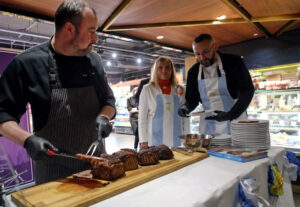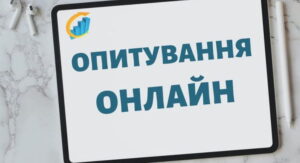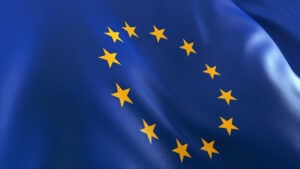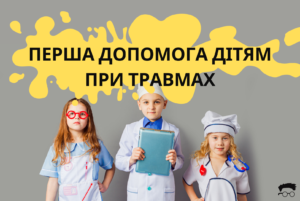
On April 17, 2024, the Embassy of the Argentine Republic in Ukraine organized a tasting of Argentine Malbec wines at Le Silpo in Kyiv on the occasion of World Malbec Day.
The presentation was opened by the Ambassador Extraordinary and Plenipotentiary of the Argentine Republic to Ukraine, Ms. Elena Leticia Teresa Mukusinski.
The history of Malbec is amazing: born in France, it failed to become popular in its homeland and moved to another continent, Argentina, where it finally received well-deserved recognition and universal love.

This grape variety was brought to Argentina in 1853 by the French agronomist Michel Aimé Puget (1821-1875), who was invited to head the agronomic farm in Mendoza by Domingo Faustino Sarmiento, an Argentine politician and future President of the Argentine Republic. The project on their foundation was submitted to the local legislative assembly on April 17, 1853, which became the starting point of Malbec’s new history.

After the cold winter of 1956, when more than 75% of Malbec vines in Europe died, Argentina became the main region where this grape variety is cultivated, and Malbec wine became a kind of visiting card of the country.

In 2011, the Wines of Argentina organization declared April 17 as World Malbec Day to promote Malbec and Argentine wines on the global market.
On January 6, 1992, Ukraine and Argentina established diplomatic relations. The Argentine Embassy in Ukraine was opened in May 1993.
Source: Diplomatic News

Ukraine’s real gross domestic product (GDP) year-on-year growth in March 2024 was 4.9%, compared to 5.0% in February and 5.2% in January, according to the Institute for Economic Research and Policy Consulting (IEPC) Monthly Economic Monitor.
“Businesses faced restrictions on electricity supply as a result of Russian shelling of energy facilities. This has held back GDP growth. In April, we also expect GDP growth to slow down due to problems with access to electricity due to massive generation destruction,” said Alexandra Betlij, a leading researcher at the IEI.
The institute estimates that real gross value added (GVA) growth in the processing industry, slowed to almost 11% in March, down from 17% in January, while real GVA in electricity generation declined by 2% and is expected to fall further in April.
It is pointed out that real GVA in transportation continued to grow by more than 20%. Growth was also maintained in construction, particularly due to the construction of budget-financed fortifications, while growth in trade slowed to 4.6%.
Among the main macroeconomic trends last month, IED experts additionally highlighted the increase in transportation by Ukrzaliznytsia and through the Ukrainian Sea Corridor, which contributes to the development of a number of sectors of the economy, record external financing in the amount of $9 bln, a decrease in inflation to 3.2% and the discount rate to 14.5%, as well as the weakening of the hryvnia to 39 UAH/$1 on the background of restrained interventions by the NBU
It is also noted that the value of merchandise exports fell sharply in March this year compared to March last year amid continued decline in grain and iron ore prices.
As reported, after Ukraine’s GDP growth of 5.3% in 2023, the National Bank expects it to slow down this year to 3.6%, while the government – to 4.6%. According to the Ministry of Economy, GDP growth for January-February this year amounted to 3.6%, while the NBU in January forecast it in the first quarter at 7.1%.

The survey, conducted by Active Group in cooperation with the Experts Club think tank, revealed citizens’ attitudes to various aspects of social and economic life in Ukraine, including the initiative to refund part of the cost of Ukrainian goods, the government’s influence on business, the level of trust in law enforcement, financial stability of citizens, and forecasts for the hryvnia exchange rate.
A significant proportion of respondents (44%) have heard of the initiative to refund the cost of purchasing Ukrainian goods, with opinions divided on its impact on living standards. Most respondents believe that the government will increase taxes to finance this initiative.
According to Andriy Yeremenko, founder of the sociological research company Active Group, this raises concerns among the population, as most are not ready for an increase in the fiscal burden.
The study also revealed a deep distrust of government institutions (57% of citizens) and law enforcement agencies (62%) in the context of relations with business, in particular due to the lack of transparency and efficiency of their work. The majority of respondents believe that the state hinders rather than helps business to develop, and this trend has increased compared to previous months.
A significant number of Ukrainians (up to 60%) are experiencing financial difficulties, including increased debt and lack of savings for a rainy day. Respondents also expressed concern about the future of the hryvnia exchange rate, with the majority (55%) expecting it to fall.
In the context of utility bills, the vast majority (67%) of respondents believe that the level of tariffs is too high, which further emphasizes the general dissatisfaction with the financial situation and government policy in this area.
According to Oleksandr Poznyi, Director of Active Group, these results demonstrate the serious challenges faced by Ukrainian society in the context of the war and the current economic situation.
Earlier, Maksym Urakin, the founder of the Experts Club think tank, noted that in 2024 Ukraine’s public debt may exceed GDP for the first time, which poses significant risks to economic stability in the country.
For more details, please see the video at the link:
https://www.youtube.com/watch?v=8hkvHhyzGLQ
You can subscribe to the Experts Club channel here:
ACTIVE_GROUP, ANDRIY_EREMENKO, ECONOMY, EXPERTS_CLUB, OLEXANDR_POZNYI, POLITICS, SOCIOLOGY, TAXES, URAKIN

European Union ambassadors will continue discussing the introduction of restrictions on Ukrainian agricultural imports on Monday after Poland and France decided that the previously reached agreements were insufficient, Interfax-Ukraine reports citing Politico..
The publication notes that the European Council’s opinion on the need for tougher restrictions practically coincides with the position of the European Parliament. Last month, the European Parliament adopted the initiative of the European People’s Party, which is convinced of the need to strengthen import restrictions and expand them to more products, particularly grain.
It is a victory for the influential European farmers’ association Copa-Cogeca, which persuaded the European Parliament to partially reject trade liberalization with Ukraine.
“But while the result is great for the lobby group and its members, it is bad not only for Ukraine, which depends on income from agricultural exports, but also for EU citizens, who will face higher food prices due to less competition and supply,” the publication noted.
There is still no unified position in the European Parliament. Its two largest groups, the European People’s Party and the Socialists and Democrats, are ready to sign up to additional restrictions, while others, including Renew Europe and the Greens, insist on approving the initial compromise.

The Consulate General of Ukraine in Toronto has sent generators to Kharkiv region, and work is underway to send a new batch, Interfax Ukraine reports, citing Ukraine’s Consul General in Toronto, Oleg Nikolenko.
“Russian missile strikes have caused serious damage to the energy infrastructure in many Ukrainian cities. The situation is critical in Kharkiv region. The government and local services are working 24/7 to resolve it. Today we sent generators from Toronto. They will help people to have access to electricity and heat until the general systems are stabilized. We are also working on a new batch,” he wrote on Facebook on Wednesday evening.
“We will pull all possible help from Canada to support our citizens. This is one of the absolute priorities of our work,” Nikolenko emphasized.
He also thanked the management of Meest Canada, a postal and logistics operator, for being a partner in this humanitarian mission.

In today’s realities, knowledge of the basics of pediatric trauma and injury care is becoming a necessity not only for medical professionals, but also for the general public. In a new video on the Experts Club YouTube channel, Mariana Bolyuk, anesthesiologist at ADONIS Medical Group, reviewed the main aspects and recommendations that will help to provide the necessary care in critical situations, based on the latest data from the Ministry of Health of Ukraine and international organizations.
Main aspects of trauma care
Traumas and injuries in children are a serious problem that requires immediate and proper response. According to the Ministry of Health of Ukraine, the number of injuries in children has been steadily increasing in recent years. In the last year alone, almost 97500 Ukrainians sought medical assistance for injuries of varying severity resulting from falls and other accidents.
According to the latest data, more than 1,806 children in Ukraine have been injured as a result of military actions. According to information from juvenile prosecutors, 537 children died and over 1,269 received injuries of varying degrees of severity. The largest number of injured children was registered in the following regions: in Donetsk region – 524, Kharkiv region – 343, Kherson region – 149, Kyiv region – 130, Dnipropetrovsk region – 125, Mykolaiv region – 103 and Zaporizhzhya region – 100.
“Among the main causes of early deaths in traumas, central nervous system contusions and bleeding stand out. It is important to know that timely first aid can save a life and significantly reduce the risk of serious health consequences”, – explained Bolyuk.
Maxim Urakin, founder of the Experts Club information and analytical center, said that the project was and is engaged in all kinds of assistance to civilians during military operations.
“According to the UN data, about 11 thousand civilians have already been killed in Ukraine for 2 years, of which about 600 are children. After the implemented project “Find loved ones” we spend our efforts on trainings on medicine for first aid for adults and children, conduct practical seminars for journalists and teachers in order to get practical skills that can save the health and life of victims”, – emphasized Urakin.
Recommendations on first aid
It is important to remember the basic principles of first aid for injuries and wounds. The main recommendations from Maryana Bolyuk and Experts Club, listed in the video:
It is also vital to receive regular first aid training to update your life-saving knowledge and skills.
Knowing the basic principles of first aid for pediatric injuries and trauma is critical for all of us. In today’s world where accidents happen daily, this knowledge and skill can be crucial in saving lives. Remember, your preparedness and ability to act in an emergency can make a significant difference.
To learn more about first aid for pediatric injuries, check out this video:
Subscribe to the Experts Club YouTube channel by clicking here:
ADONIS, CHILDREN, EXPERTS CLUB, FIRST_AID, FIRST_AID_PROVIDER, URAKIN, БОЛЮК